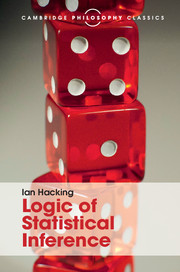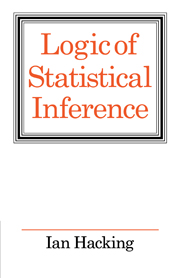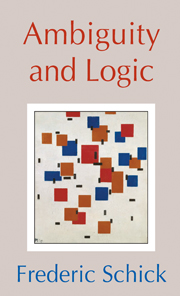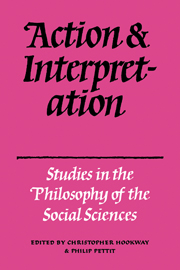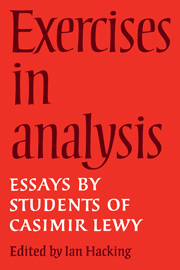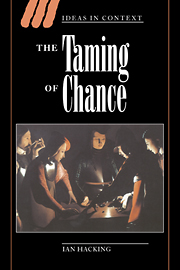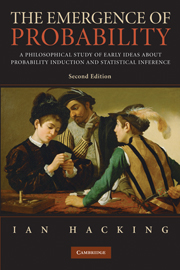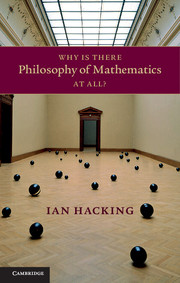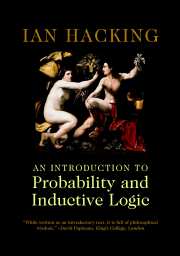
An Introduction to Probability and Inductive Logic
- Author: Ian Hacking, University of Toronto
- Date Published: July 2013
- availability: This ISBN is for an eBook version which is distributed on our behalf by a third party.
- format: Adobe eBook Reader
- isbn: 9781139632744
Find out more about Cambridge eBooks
Adobe eBook Reader
Other available formats:
Hardback, Paperback
Looking for an inspection copy?
This title is not currently available for inspection. However, if you are interested in the title for your course we can consider offering an inspection copy. To register your interest please contact [email protected] providing details of the course you are teaching.
-
This is an introductory 2001 textbook on probability and induction written by one of the world's foremost philosophers of science. The book has been designed to offer maximal accessibility to the widest range of students (not only those majoring in philosophy) and assumes no formal training in elementary symbolic logic. It offers a comprehensive course covering all basic definitions of induction and probability, and considers such topics as decision theory, Bayesianism, frequency ideas, and the philosophical problem of induction. The key features of this book are a lively and vigorous prose style; lucid and systematic organization and presentation of ideas; many practical applications; a rich supply of exercises drawing on examples from such fields as psychology, ecology, economics, bioethics, engineering, and political science; numerous brief historical accounts of how fundamental ideas of probability and induction developed; and a full bibliography of further reading.
Read more- Lively and rigorous style; clear and systematic presentation; assumes no prior knowledge of symbolic logic
- Contains lots of exercises with examples from psychology, bioethics, ecology, economics and political science; shows practical applications
- Hacking internationally known; 5 previous CUP books; Modern Library selected Taming of Chance as one of 100 best books of the twentieth century
Reviews & endorsements
'Hacking's book excels … especially in the practical, concrete examples. It uses minimal mathematics and presumes no acquaintance with symbolic logic. It is well suited for graduate or advanced undergraduate courses in inductive logic or related areas (such as philosophy of science or methodology courses in particular empirical sciences). The book gives a nice introduction to inductive logic.' Harry Gensler, The Times Higher Education Supplement
See more reviews'This is, as intended, a very introductory text in probability and inductive logic.' Zentralblatt für Mathematik
Customer reviews
Not yet reviewed
Be the first to review
Review was not posted due to profanity
×Product details
- Date Published: July 2013
- format: Adobe eBook Reader
- isbn: 9781139632744
- availability: This ISBN is for an eBook version which is distributed on our behalf by a third party.
Table of Contents
Part I. Logic:
1. Logic
2. What is inductive logic?
Part II. How to Calculate Probabilities:
3. The gambler's fallacy
4. Elementary probability
5. Conditional probability
6. Basic laws of probability
7. Bayes' rule
Part III. How to Combine Probabilities and Utilities:
8. Expected value
9. Maximizing expected value
10. Decision under uncertainty
Part IV. Kinds of Probability:
11. What do you mean?
12. Theories about probability
Part V. Probability as a Measure of Belief:
13. Personal probabilities
14. Coherence
15. Learning from experience
Part VI. Probability as Frequency:
16. Stability
17. Normal approximations
18. Significance
19. Confidence and inductive behaviour
Part VII. Probability Applied to Philosophy:
20. The philosophical problem of induction
21. Learning from experience as an evasion of the problem
22. Inductive behaviour as an evasion of the problem.
Sorry, this resource is locked
Please register or sign in to request access. If you are having problems accessing these resources please email [email protected]
Register Sign in» Proceed
You are now leaving the Cambridge University Press website. Your eBook purchase and download will be completed by our partner www.ebooks.com. Please see the permission section of the www.ebooks.com catalogue page for details of the print & copy limits on our eBooks.
Continue ×Are you sure you want to delete your account?
This cannot be undone.
Thank you for your feedback which will help us improve our service.
If you requested a response, we will make sure to get back to you shortly.
×
